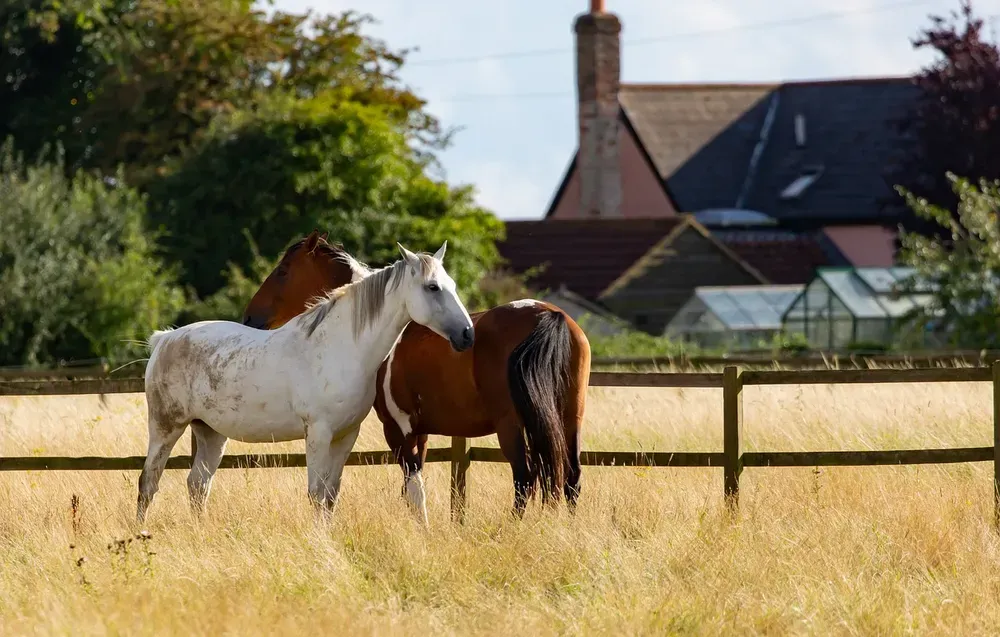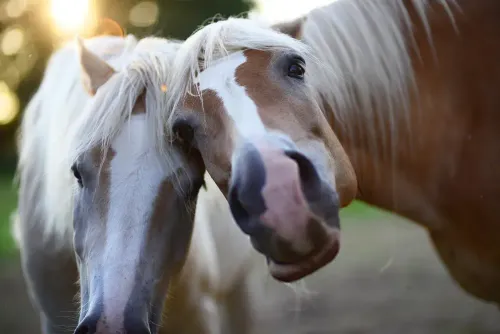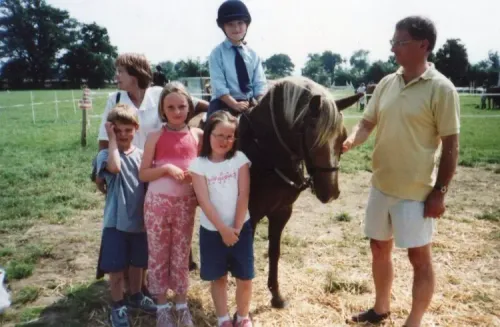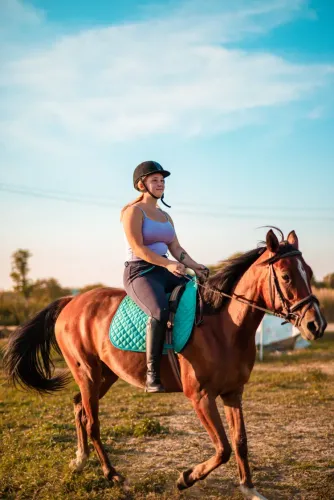
Table of Contents
Words of wisdom by Pam Brown
“A horse is the projection of peoples’ dreams about themselves – strong, powerful, beautiful – and it has the capability of giving us escape from our mundane existence.”
Regardless of age, buying your first horse is an exhilarating experience. I rode horses for various owners until at 25 years of age I purchased my first horse with very limited funds. I spent my youth up to this point at a “poor cousin” dreaming about the sort of horses I would have. In reality, buying your first horse comes with many challenges and tribulations, and without due care, you may find yourself with a less-than-optimal horsey experience. You should also be aware that owning a horse can be a timely and costly affair, though don't let that put you off, there are ways to offset the costs.
In this guide, we'll explore the critical factors to consider before purchasing a horse and offer valuable insights to help you make a well-informed decision for your first horse.

Article Suggestion
5 Money Saving Tips for Horse OwnersSeek Knowledgeable Guidance
As with many professions, In the horse world, there are people with Limited Knowledge who are full of advice, these people certainly do exist and whilst their intentions are usually well hearted they can be an easy way to become misdirected. This is certainly something you want to avoid! We want your first adventure in the saddle to be as comfortable and as safe as possible whilst affording you the ability to grow into an equine pro.
Well-intentioned advice from friends, family, or acquaintances may not always be accurate. However, you may well be lucky enough to have veteran horse blood in your family, seeking advice from these people will help save you some money upfront. Be cautious though, you are looking for someone with years of riding experience, not someone who's had a few or even many riding lessons. Instead, seek advice from professionals who have a good reputation within the horse industry and above all else a passion for the animals.
A knowledgeable horse trainer, riding instructor, or equine veterinarian can offer valuable insights. They can assess your riding abilities, understand your goals, and recommend a suitable horse based on your experience and aspirations. While their expertise might come with a cost, the investment will be worth it in the long run, as it can prevent costly mistakes and ensure a harmonious partnership with your future horse.
This guide is a great place to start, however, you will want to find a professional who can help guide you with your in-person purchase.
Assess Your Riding Experience and Ability
It's assumed that if you're buying your first horse you will have at least some level of experience in the saddle, whether that be from an age gone by or more recent experience in the form of a riding school or something similar.
Gain real experience first!
Please note that if you have zero riding experience then it's advisable to gain some real-world experience beforehand to test your levels of enthusiasm for the hobby before jumping the gun. It's easy to underestimate the amount of work required in keeping and owning a horse.
What should I expect when owning my own horse?
Unless you are already immersed in a horse culture and have knowledge you must expect to start on a natural learning curve, Along the way, there will be disappointments, trials and tribulations. but to balance this there will be times of total enjoyment and exhilaration. Expect to get dirty and tired, but also expect to improve your fitness. You will probably lose weight and improve your emotional well-being.
When looking to purchase your first horse you must become self-aware of your current riding ability (this is where the in-person expert can help you). If you are still a beginner, it's essential to start with a reliable trainer or instructor who can help you build a solid foundation in horsemanship. In this phase, you'll need a gentle and patient beginner's horse, capable of instilling confidence while providing a safe and enjoyable learning experience.
Many types and breeds are suitable but the horse must be quiet and responsive. It is equally important your horse or pony is the right size for your shape and size. For most people a horse under 16hh is suitable. Many adults will be suited to a large native breed or for more height a native crossed with something taller.
Suitable horse breeds for beginners
- Connemara and New Forest ponies of about 14.2hh and they will comfortably carry a 140-pound rider.
- Highland, Fell and Dale ponies are very suitable and will easily carry a 170-pound rider.
For a taller horse standing around 15.2hh or a bit shorter any of the above pony breeds crossed with a thoroughbred or warm blood often produces the correct type of horse.
The horse options available are broader for those with more riding experience, but it remains imperative to choose carefully. As you begin to explore potential horses, remember that the compatibility between you and the horse is paramount. One person's ideal of a perfect horse may be totally different from your needs and requirements.
The horse's personality, temperament, and training level should align with your current riding abilities. This ensures a smoother transition into horse ownership and fosters a positive bond between you and your equine partner, allowing for more room to improve your skills and enjoy the hobby.

Article Suggestion
What to look for in a First PonyDefine Your Horse's Purpose
Finding the right horse can be a timely task, it's essential to have a clear understanding of your intended purpose for the horse. If you are primarily interested in leisurely trail riding or casual hacking, a well-rounded and level-headed horse with a calm disposition might be most suitable. On the other hand, if you have some experience and aspire to compete at grass grassroots level in specific equestrian disciplines such as dressage, show jumping, or eventing, you'll need a horse with the appropriate athleticism, conformation, and training for the chosen discipline.
You will also need to consider your long-term goals. If you plan to progress in your equestrian pursuits and already have a degree of experience, choosing a horse that can grow with you and handle increasing challenges is a smart investment. Discuss your ambitions with your knowledgeable professional who will be able to help you find a horse that aligns with your aspirations and present ability.
- For endurance riding pick a horse with considerable Arabian blood.
- For eventing, the higher your aspirations, the more thoroughbred blood is required, but to begin with a small horse that enjoys jumping and has a give-it-a-go attitude will be the correct mount.
- Show jumpers are typically warm blood and must be careful jumpers. However, your first horse will not need to have scope, but must take you quietly around a small course of jumps.
- Dressage horses are also typically warm blood and at higher levels must be able to lift their forehand and engage their quarters. At the grassroots level, many horses are able to compete but you will need a horse that is forward-moving and can carry their heads just in front of the verticle. This means that real nose pointers or those that carry their heads too high should be avoided.
Going to look at horses
Viewing horses for sale is a joyful experience, and the thought of bringing home your new horsey friend is an exciting prospect. However, finding the right horse generally takes time, and you may reject a number before finding the correct horse for your ability and aspirations. Never expect to find the correct horse on the first day of looking. If you have little knowledge you will need the support of a professional with “an eye for horses”.
The horses you look at must be tried and ridden as this is the only way of assessing their ridden suitability. They must be seen doing what you expect from them. If you do not have the experience to do this you must have support from a knowledgeable and supportive rider.
The basic checklist when testing out a horse
When going to look at horses you should take into consideration the following basic horse requirements to ensure a perfect horsey partner match:
- A kind personality with no biting or kicking tendencies.
- Good ground manners, such as being easy to catch, standing calmly for grooming, and tacking up.
- A horse that stands quietly for mounting.
- A pleasant ride, with no issues like napping, spooking, bucking, bolting, or rearing, and a willingness to try new things.
- Reliable brakes for easy stopping.
- A horse without significant health issues that might hinder your intended use.
Consider The Horse's Age
When buying your first horse, age matters. A seasoned and experienced horse is generally the best option for inexperienced riders as they are more tolerant and have more life experience. Younger horses may require additional training and may not have the patience or consistency required to support a novice rider's learning process, this can lead to frustration at best and a danger hazard for yourself at worst. For most first-time horse owners, a horse around 10 years old or older is a suitable choice. Such horses have typically gained valuable training and life experience, making them more forgiving and predictable.
Did you know?
The oldest horse on record was 62 years of age! Old Billy, bred by Edward Robinson in Lancashire, UK. However, in general, horses tend to live for around 25 - 30 years.
Vet Check
Having occasionally purchased a cheap horse without a veterinary report I realise just how dangerous this route can be. Before finalising the purchase, always have the horse thoroughly examined by a qualified veterinarian. The vet check should include a comprehensive evaluation of the horse's health, conformation, and suitability for your intended purpose. A veterinarian can detect any underlying health issues that might affect the horse's ability to perform or lead to future complications. Always remember, that If soundness issues are suspected the horse must be rejected.
When buying your first horse it is unlikely that x-rays will be required unless the vet is worried about a particular problem.
Horse Buying Costs
I am often asked how much should I spend on my first horse, and the answer of course depends entirely on where you live and which sort of horse you require. Here are important considerations.
- Taller horses are generally more expensive than similar but shorter animals. So why go for a tall horse unless this is necessary?
- Fashionable breeds are more expensive as they are in greater demand.
- Breeds and types of horses that are rare are more expensive.
- Inexperienced recently broken horses are cheaper than those with more experience, but these recently broken horses are not suited to inexperienced riders.
- Horses in their late teens and towards the end of their ridden lives are cheaper but have less of a working life in front of them.
The take-home message
When going to buy your first horse be realistic about your knowledge and experience. Seek advice from trusted professionals and follow the recommendations they give you. The more novice you are the more important it is to have a quiet and easily handled horse. If you have experience a more athletic type can be sought. Always have the horse you are to purchase vetted for suitability and follow the advice given by your vet if the horse is not a suitable purchase. Finally, never buy a horse without having it ridden and tested for suitability considering your intended purpose.
Remember that purchasing your first horse is a big decision, but with the correct support, a suitable horse can be obtained and your equestrian dreams can be realised.

Article Suggestion
Picking the Right Horse for the Rider’s Weight
